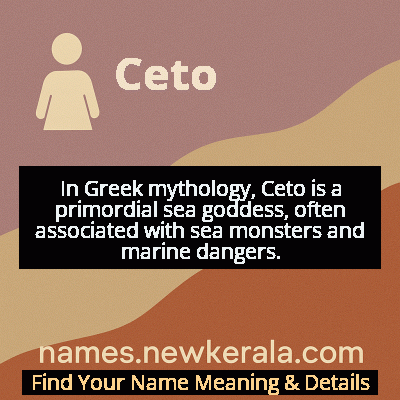Ceto Name Meaning & Details
Origin, Popularity, Numerology Analysis & Name Meaning of Ceto
Discover the origin, meaning, and cultural significance of the name CETO. Delve into its historical roots and explore the lasting impact it has had on communities and traditions.
Name
Ceto
Gender
Female
Origin
Greek
Lucky Number
7
Meaning of the Name - Ceto
In Greek mythology, Ceto is a primordial sea goddess, often associated with sea monsters and marine dangers.
Ceto - Complete Numerology Analysis
Your Numerology Number
Based on Pythagorean Numerology System
Ruling Planet
Neptune (Ketu)
Positive Nature
Intuitive, analytical, spiritual, and inquisitive.
Negative Traits
Secretive, reserved, aloof, and can be overly critical.
Lucky Colours
Green, yellow.
Lucky Days
Monday.
Lucky Stones
Cat’s eye, moonstone.
Harmony Numbers
1, 5, 6.
Best Suited Professions
Scientists, researchers, spiritual leaders, detectives.
What People Like About You
Depth of knowledge, analytical skills, spirituality.
Famous People Named Ceto
Ceto (Mythological)
Primordial Sea Goddess
Mother of sea monsters including the Gorgons, Graeae, and other marine deities
Ceto (Literary Character)
Fantasy Character
Featured in various fantasy novels and mythological retellings as a powerful sea entity
Ceto (Scientific Reference)
Astronomical Body
Name used for theoretical celestial objects in science fiction and astronomical discussions
Name Variations & International Equivalents
Click on blue names to explore their detailed meanings. Gray names with will be available soon.
Cultural & Historical Significance
Her mythological importance extends beyond her immediate family connections. Ceto embodies the ancient Greek conception of the sea as a realm of both bounty and peril, reflecting the reality faced by ancient Mediterranean civilizations who depended on the sea for survival while fearing its storms and mysterious creatures. The name Ceto itself derives from 'kētos,' meaning 'sea monster' or 'whale,' linguistically connecting her to the most formidable marine beings. This cultural representation served as both explanation and personification of the very real dangers ancient sailors faced, while also acknowledging the sea's essential role in trade, food, and cultural exchange throughout the Greek world.
Extended Personality Analysis
Individuals named Ceto typically exhibit a complex personality characterized by depth, intuition, and formidable inner strength. Like the sea goddess they're named after, they often possess a mysterious quality that draws others to discover their layered nature. These individuals tend to be highly intuitive, with strong emotional intelligence and the ability to understand unspoken currents in relationships and situations. Their strength is not always immediately apparent, much like the calm surface of the ocean hiding powerful depths beneath.
Ceto-named individuals often demonstrate remarkable resilience and adaptability, capable of weathering emotional storms with grace and emerging stronger from challenges. They frequently exhibit strong protective instincts, particularly toward family and close friends, reflecting the maternal aspects of their namesake. While they can appear serene and composed, they possess intense passion and conviction when their values or loved ones are threatened. Many develop interests in creative pursuits, psychology, or environmental causes, drawn to understanding and protecting the deeper aspects of life and nature. Their combination of wisdom, strength, and mystery often makes them unforgettable figures in the lives of those who know them.
Modern Usage & Popularity
In contemporary naming practices, Ceto remains an exceptionally rare choice, primarily embraced by parents with strong interests in classical mythology, unique names, or maritime heritage. According to available birth records, the name appears fewer than five times annually in most Western countries, maintaining its status as a highly distinctive selection. Its modern usage is largely concentrated among academic families, mythology enthusiasts, and those seeking powerful, gender-neutral names with deep historical roots. While not trending in mainstream naming circles, Ceto has gained some recognition through the growing popularity of mythological names in fantasy literature and media. The name's appeal lies in its combination of ancient significance and contemporary uniqueness, offering a strong alternative to more common mythological names like Athena or Artemis. Recent years have seen increased interest in ocean-related names due to growing environmental awareness, potentially positioning Ceto for slightly increased visibility among eco-conscious parents seeking meaningful, nature-connected names.
Symbolic & Spiritual Meanings
Ceto carries rich symbolic meanings that extend far beyond her mythological role as a sea goddess. She represents the primordial power of nature in its most untamed form - the chaotic, creative, and destructive forces that existed before human civilization attempted to impose order. Symbolically, Ceto embodies the concept of the 'monstrous feminine,' challenging conventional notions of femininity by representing power that is both generative and terrifying. Her symbolism encompasses the mysteries of the deep unconscious, the hidden aspects of personality and society that remain unexamined. As mother to both beautiful and fearsome creatures, she represents the duality of creation - that beauty and terror often emerge from the same source. Ceto also symbolizes the ancient wisdom of the natural world, the enduring patterns of life that persist despite human attempts at control. In psychological terms, she represents the shadow self - those aspects of personality that society deems 'monstrous' but which contain essential truths and strengths. Her enduring symbolic power lies in reminding us that true understanding requires acknowledging both the light and dark aspects of existence.

